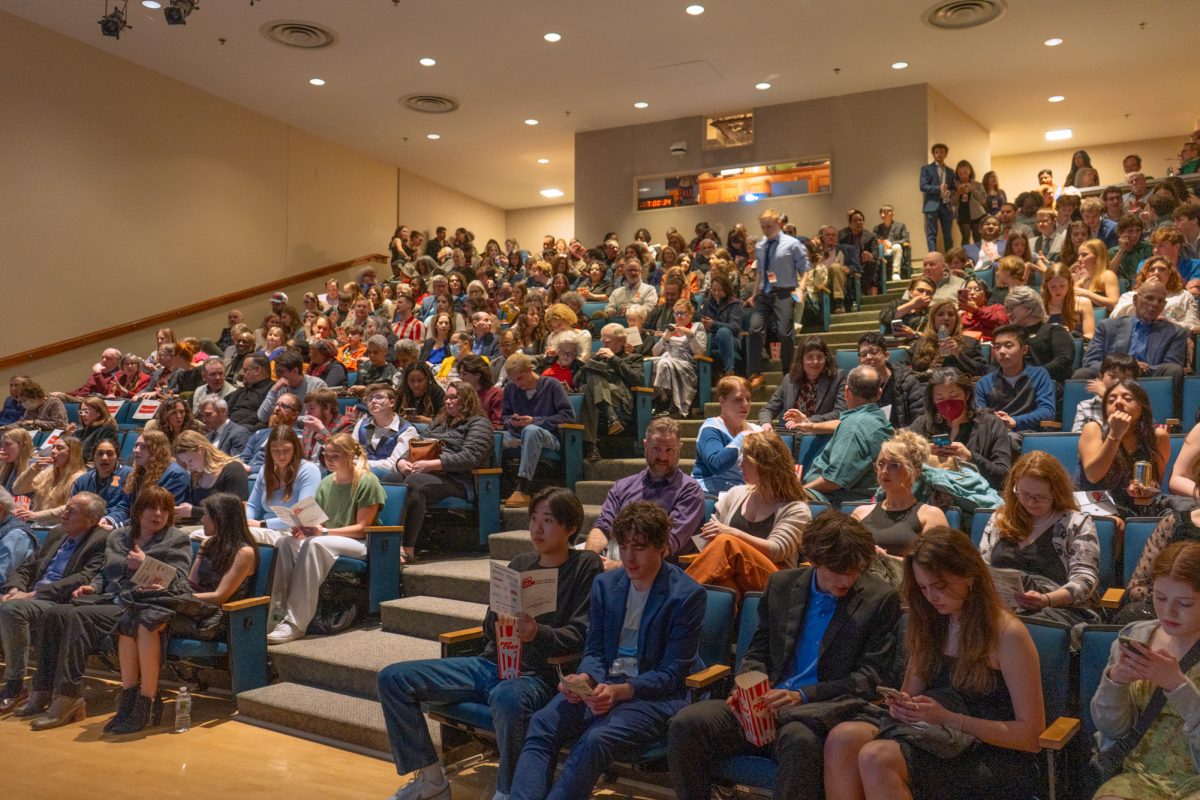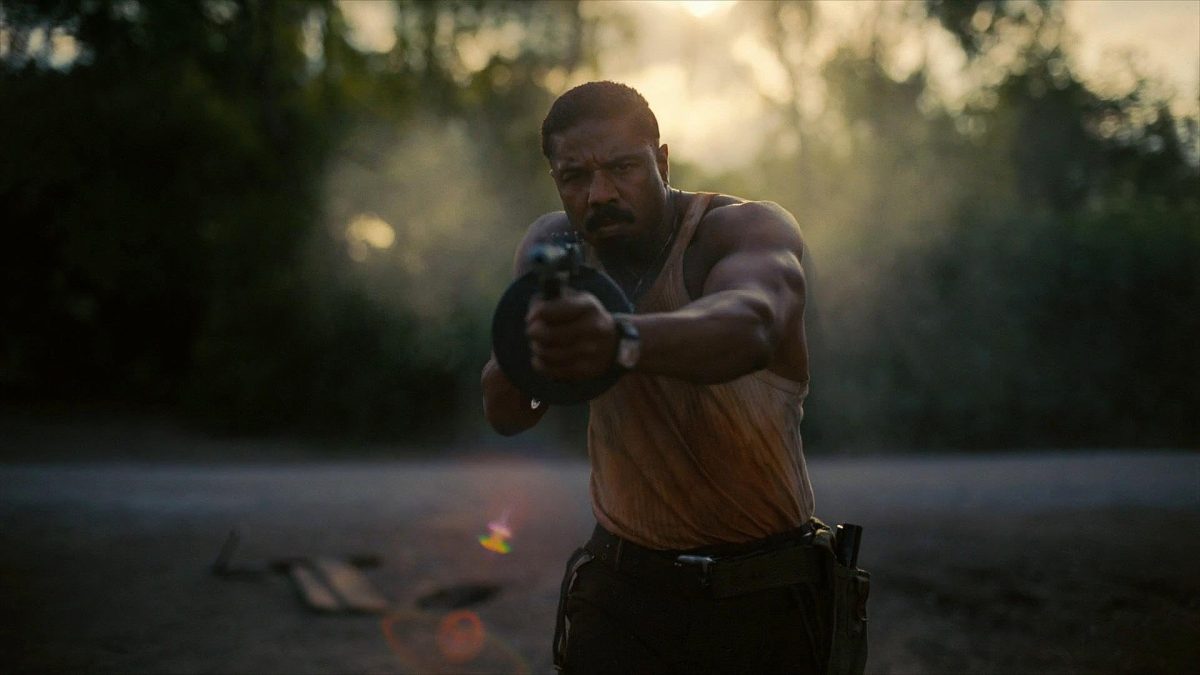Last Saturday, the Knight Auditorium at the Spurlock Museum played host to four of the most groundbreaking and acclaimed short films of the last few years as part of the CU International Film Festival.
This was the second iteration of the festival, which aims to create a space for filmmakers from around the world to showcase their creations to film lovers in the Champaign-Urbana area.
The festival was founded and directed by Max Libman, a senior at Academy High in Champaign, who has possessed an interest in filmmaking from a young age.
“My passion for storytelling and films inspired me to provide a platform for other filmmakers to share their stories,” Libman said. “So, about two years ago, I founded CU International Film Festival, which is a 501(c)(3) nonprofit whose mission is to showcase films from around the world that entertain, educate and elevate.”
The event kicked off with a red carpet gala. The crowd was then ushered into the auditorium for a welcoming address by Terrence “TAT” Taylor, the official DJ for the Fighting Illini, and followed by some words from Libman.
The event was kicked off with a virtual address from Emmy-nominated actor Ed Begley Jr., who spoke about the evolution of filmmaking and cinema he has witnessed throughout his career.
“There was a camera for TV shows and movies that was the size of a large kitchen appliance, almost half of a refrigerator-size,” Begley said. “Now you’ve got people making wonderful movies on their cell phone, and they’re actually good movies.”
Get The Daily Illini in your inbox!
The film selections were meticulously chosen by a jury to reflect the aforementioned three Es: entertain, educate and elevate.
“We have a panel of judges and jurors of industry experts go through the films, and the top ones that they select are the ones we show at our festival,” Libman said.
There was a total of four movies showcased on the night, each belonging to one of the following divisions: High School, College and Short Film.
The first movie was called “nothing, except everything,” directed by Wesley Wang. The film explores the psyche of a graduating high schooler (David Mazouz) trying to find meaning and purpose in the chaos of this stage of life.
Tackling the universal anxieties and reflections high school students undergo as they look toward the next chapter of their lives with an entertainingly maximalist flair, Wang’s short was uniquely bold and relatable.
The next movie screened was “Pink Mountain,” a stop-motion animated film directed by Greek filmmaker Thomas Kunstler. The film, told without dialogue, follows a florist who attempts to court a Pasha’s bride.
According to the festival’s program, the film adapts an ancient Ottoman fairy tale. Kunstler’s film succeeds in the detail and intent that went into building the world. The specificity with which the director framed his shots, alongside the lushness of the scenery and location made the film a joy to watch.
If perhaps a fairly traditional tale of a woman confined by royal structure and a lower-class hero seeking to free her, Kunstler foregrounds personal emotion and an interesting sadness that makes the film feel unique.
The stop-motion animation was particularly striking. The movement of all the characters felt fluid, and the environment felt alive. Bolstered by well-realized colors and atmospheric sound design, the film’s craft stood out.
The third movie in the showcase was English filmmaker Chris Overton’s Oscar-winning short film “The Silent Child.” The film, the longest of those screened at 20 minutes, follows the story of a deaf child (Maisie Sly) who lives in a hearing family.
As the child prepares to start school, the family hires a social worker (Rachel Shenton) to help her prepare and acclimate. As the film goes on, the social worker and the girl form a strong connection while tensions grow within the family.
Overton’s film, the recipient of the Best Live Action Short Film at the 2018 Oscars, works to emotionally communicate its message. Much of the film follows the liberation of Libby, the child, as the social worker Joanne teaches her to express herself through sign language. Libby’s journey is played at odds against Sue (Rachel Fielding), the family matriarch, who insists Libby sticks to lip-reading at the behest of Joanne.
The film excels at illustrating Libby’s separation from her family and how her family’s lack of understanding of her deafness only furthers this isolation. Contrasting the isolation with the warmth she feels towards Joanne, Overton was able to wring strong emotional impact with the film’s ending calling awareness towards deaf children who live in hearing families primarily through this emotion.
The film was followed by a short clip of the team behind “The Silent Child” as they reacted live to their Oscar nomination.
The final film screened was “Team Dream,” a short documentary that depicts Black senior swimmers Ann Smith and Madeline Murphy Rabb on their journey to compete at the National Senior Games. Directed by Luchina Fisher, the film is entertaining and motivational.
Fisher’s direction highlights the personality of Smith and Rabb well, allowing their charisma and passion to bridge the audience closer to their ambitions.
In leading up to the National Senior Games, the film introduces us to the characters and the motivation behind Team Dream and emphasizes what a prolific life Rabb lived outside of her swimming pursuits. Fisher succeeds at showing how exceptional these women are and the amount of work and training that goes into realizing this passion.
The final stretch of the film documents all four days of the National Senior Games and engages in how it portrays the thrill of the event. Fisher films either in overarching drone shots or tight shots that place us in the water or on a bench with the rest of the participants. In feeling like you are there, the film connects you further with Smith and Rabb’s positivity as they deal with their victories and defeats.
The film concludes with a satisfying and breezy look into the legacy of the women and how vital it is to stay motivated.
The film was given the festival Centerpiece award. The screening of the film was followed by a ceremony where the coach of Team Dream, Derrick Q. Milligan, accepted the award in person.
The second annual CU International Film Festival proved to be an infectious celebration of filmmaking. With a strong selection of films that entertained and educated on personal topics, the festival joyfully conveyed the humanity that makes film and filmmaking uniquely powerful.













